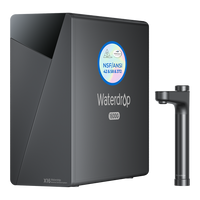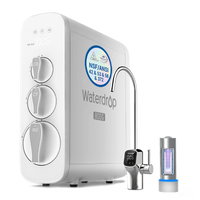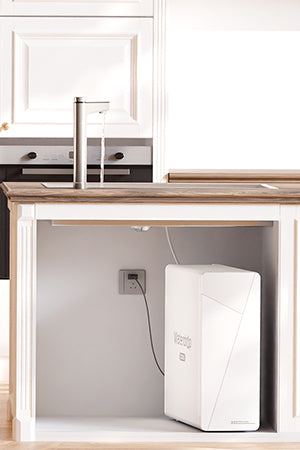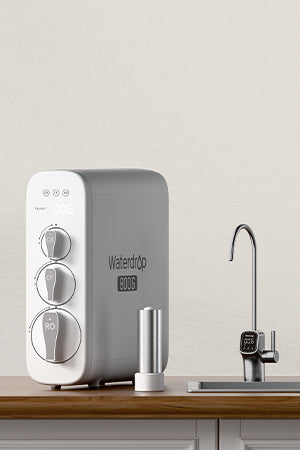If you've ever seen white spots on your glasses, soap that doesn't lather properly, or itchy skin after a shower, you may have hard water. Hard water is a universal problem in much of Canada. It's not a severe health threat, but it creates a variety of issues around the home, ranging from clogged pipes to reduced appliance longevity.
Know your water hardness level to make a step towards good water quality. Here, you'll know what water hardness is, why it’s important, and how you can quickly test it at home.
What Is Water Hardness?
Water hardness is how much calcium and magnesium minerals are dissolved in your water. When rainwater flows over soil and rocks, it picks up these minerals naturally. When there are more, water gets harder.
Hard water isn’t bad to drink, but it may impact your plumbing, appliances, and comfort. Like, hard water deposits limescale in kettles, washing machines, and pipes. It also acts against soap, making it work less effectively and leaving a scum mark on dishes, sinks, and even your skin.
Why Should You Test Your Water Hardness?
Test your water hardness as it will enable you to:
1. Preserve appliances and pipes. Hard water makes minerals precipitate out in water heaters, dishwashers, and washing machines. With time, it decreases efficiency and can cost a lot to repair.
2. Get better cleaning efficiency.
Soft water makes soap and detergent effective . You will have a feeling that your dishes, clothes, and hairs are cleaner and softer.
3. Spend less. Soft water saves you money by making your appliances operate in a more efficient manner. It also makes them last longer.
4. Get to know your
local water quality . Water hardness levels fit a huge range across Canada. Testing makes you know precisely what you are working against locally.
5. Make wise filtration choices. If you have hard water, you have the freedom to select the correct filtration or softening option to enhance your water quality.
How to Test Water Hardness in the Home?
There are a few good ways to measure your water hardness. You don’t have to be a professional—most of these take just a few minutes to complete.
1. Test a Water Hardness Test Kit
The easiest testing of
water hardness can be done with a test kit. It can be bought from the net and hardware stores and costs little to use it in a household.
How to use a test kit:
- Take a sample of your kitchen-sourced water in a clear glass.
- Immerse the test strip in the water for a few seconds.
- Wait until the strip alters in color.
- Compare the strip color to the color chart provided in the kit.
Each indicates a certain level of hardness, which can tell you if your water is soft, moderate, or hard. Some of the high-level kits come with digital readers that display the level of hardness in milligrams per liter or in grains per gallon. These are more precise and reusable.
2. Give the Soap Test (A Basic DIY Alternative)
If you lack a test kit, there’s a cheap and inexpensive way to approximate your water hardness.
What you'll need:
- A clear, transparent bottle with a covering
- Liquid dish soap
- Tap water
Steps to take:
- Pour tap water to fill the bottle one-third.
- Put a few drops of liquid dish soap.
- Shake the bottle hard for some 10 seconds.
If the water has a lot of bubbles and seems clear underneath, your water has probably been softened. If the water seems cloudy and has few bubbles, it’s likely to be hard. Though this test isn’t reliable, it gives a fast idea of whether or not your water has a lot of minerals.
3. Furnish a Sample to a Laboratory
For more precise and specific information, you are able to submit a water sample to a accredited laboratory. Laboratory analysis gives you precise readings of your water's calcium and magnesium, as well as other data like pH, chlorine, or heavy metals.
This feature comes in handy particularly if:
- You have a water source from a private well.
- You smell or see something strange in your water.
- You are looking for a full water quality analysis, not hardness readings.
Laboratory analysis may take a few days, but it’s the best approach to surefire knowledge of just what’s in your water.
What Is the Average Water Hardness in Canada?
Hardness of water can be highly inconsistent throughout Canada. Certain areas, such as British Columbia and Quebec, have softer water due to the fact that their water supplies are taken from mountain reservoirs. Other areas, such as
Alberta and Ontario, tend to have harder water since the water must pass over limestone and soil that contains many ores.
For instance, Edmonton and Calgary have extremely hard water. Toronto has medium-hard water, and Montreal has soft water normally. That’s why water testing matters so much—your readings may vary significantly based on your geographical spot, pipes, and of course, time of year.
Does Hard Water Affect Your Health?
From a health standpoint, hard water is not harmful to drink. Those minerals that cause it to be hard, predominantly calcium and magnesium, are essential nutrients that each body requires.
However, some people prefer softer water for the following reasons:
- Taste: Hard water may occasionally have a metallic or chalky flavor.
- Health of skin and hair: Hard water could make your skin dry or irritated if you have sensitive skin.
- Preparing and cleaning: Soft water increases soap suds and inhibits spots due to minerals on dishes and glassware.
In a nutshell, hard water is not harmful, but it can create small annoyances that impact your comfort and home maintenance.
How to Soften Hard Water?
If your test indicates that you have hard water, there are some good ways to handle it.
1. Install a Water Softener
A conventional water softener achieves this function by replacing calcium and magnesium ions to sodium or potassium ions. This deletes water hardness from your water supply as well as forestalls buildup of minerals in pipes and appliances.
Such systems are best suited for hard water, particularly in places such as Alberta or Saskatchewan. But if you're primarily worried about water drinking quality, you may not need a whole-house softener. Then a mini filtration system may be more reasonable.
2. Install a Reverse Osmosis (RO) System
One of the best methods to lower hardness and improve water quality is a
reverse osmosis system . It involves pushing water against a semipermeable membrane, which deletes the minerals, chemicals, as well as other contaminants.
One good example is the
Waterdrop X Series Reverse Osmosis System that has several filtration levels to take out as much as 99% contaminants, which are calcium, magnesium, chlorine, and heavy metals.
It’s a good solution if you desire pure, soft-flavored water directly from your tap. The compact version sits comfortably underneath your sink, and the intelligent indicators remind you when it’s replacement time.
Reverse osmosis systems soften water as well, but they boost flavor and make sure your water to drink does not contain harmful contaminants.
3. Use a Filtration Pitcher or Faucet-Mounted
If you rent or have a compact space, a
filtration pitcher or a faucet-mounted filter is a quick and easy solution. Those can lower hardness to a degree and remove general contaminants found in water, such as chlorine and lead. They are not as strong as full-house systems, but they are cheap and user-friendly.
Takeaway
It's easy, inexpensive, and a crucial aspect of water quality maintenance for your home to test your water hardness. With a test kit, a digital meter, or you can have a sample sent to a laboratory, understanding how hard your water is makes you a wiser consumer for your home.
If you happen to find out that your water is hard, you may want to install a
Waterdrop water filtration system or other filtration system. It’s a once-in-a-lifetime investment that enhances your water quality, and makes every drop of water throughout your household taste pure and fresh.










































































